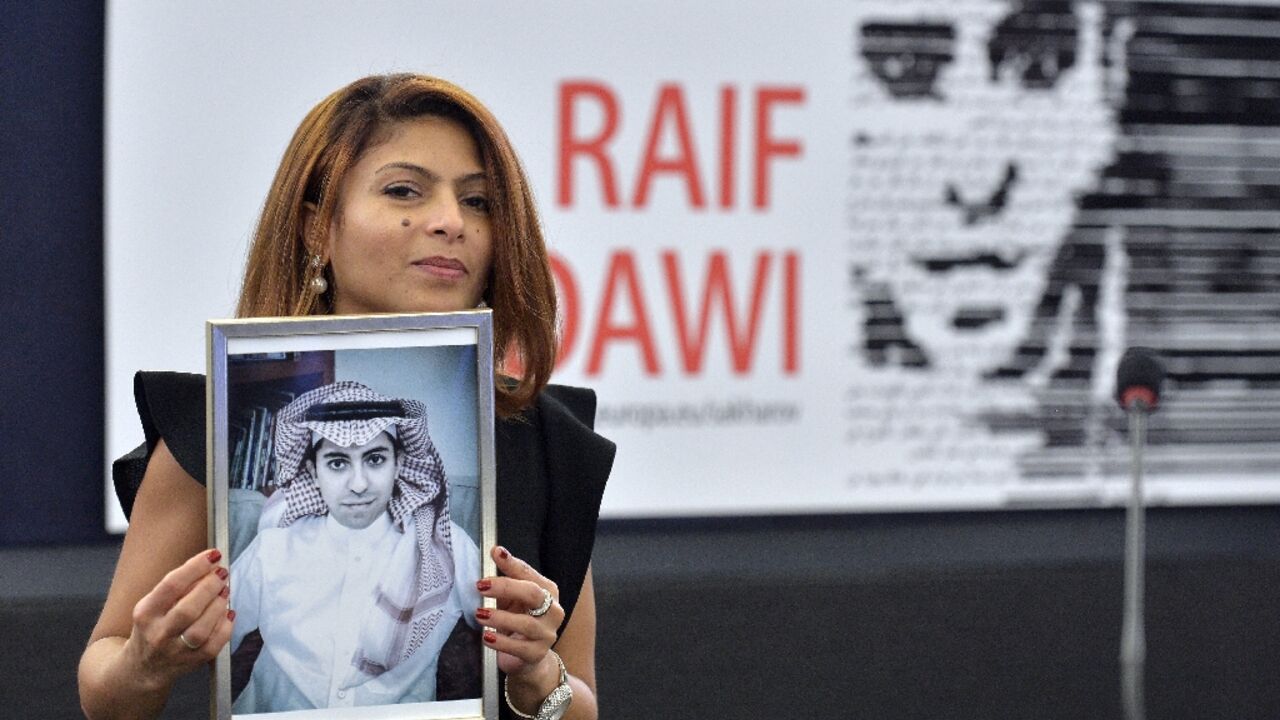Flogged for blogging: Saudi free speech champion Raif Badawi

Saudi blogger and rights activist Raif Badawi, who was released from prison Friday after 10 years in jail and 50 lashes, has become a symbol of free speech far beyond the conservative Muslim kingdom.
The 38-year-old -- whose public flogging in a Jeddah square after he was sentenced to 1,000 lashes sparked an international outcry -- was taken into custody in 2012 for charges including undermining security and insulting Islam via his website.
Badawi was arrested under Saudi Arabia's draconian cybercrime law, and his website shut down by court order, after he blogged his criticism of the "mutawa" religious police -- a now waning force tasked with overseeing compliance with Islamic law.
Badawi had also called for peaceful assembly to mark a "day of liberalism", and an end to the role of religion in politics.
Rights group Amnesty International had said he actually completed his prison sentence on March 1.
Badawi received his first whipping of 50 lashes in January 2015, but the rest were suspended after global condemnation.
The United Nations had described the penalty as "cruel and inhuman".
Saudi Arabia eventually abolished flogging in April 2020.
Badawi suffered health problems during his imprisonment.
Details of his release conditions were not immediately available, but he was expected to face a 10-year ban on leaving Saudi Arabia.
Ensaf Haidar, his wife of 20 years, said in 2018 that she and their three children had not seen him for nearly eight years. They are now Canadian citizens.
Speaking to AFP last week, she said: "I hope one day to live normally with my children and my husband.
"He is an open-minded man, he loves freedom, he likes women to be independent," she added.
Shortly before his sentence was due to be completed, Haidar began counting down the days on Twitter.
"He calls us once or twice a week. Sometimes he goes quiet," Haidar had told AFP in 2018 from her residence outside Montreal.
"It depends on his mental state. Right now it's not good, which I think is normal given that his kids are growing up without him."
- 'Cruel suffering' -
If Badawi is allowed to leave Saudi Arabia, he will be able to live in Canada after lawmakers voted unanimously to grant him citizenship.
The issue has vexed relations between Saudi Arabia and Canada, which called for the release of jailed activists in 2018. In retaliation, Riyadh expelled the Canadian ambassador, froze trade with Ottawa and moved Saudi scholarship students to other countries.
But last year, the kingdom started releasing a number of rights activists in response to global pressure, including Loujain al-Hathloul in February 2021 followed by Raif's sister Samar Badawi and Nassima al-Sadah last June.
Haidar had fled the country with the couple's children years before his arrest. He had, she says, a premonition of what was to come.
She and her children have since received death threats, while she has also been the victim of sexual harassment by online trolls.
Badawi's sister and activist Samar and his lawyer, Waleed Abu al-Khair, had also been arrested on charges linked to freedom of expression.
In 2013, a court in the Red Sea city of Jeddah sentenced Badawi to seven years in jail and 600 lashes for insulting Islam and setting up a liberal online forum.
The public prosecutor appealed to stiffen the sentence, eventually winning a harsher term: 10 years and 1,000 lashes.
Witnesses recount how Badawi kept silent and did not cry out once when he received his 50 lashes in Jeddah.
Badawi recounted the experience in his first letter from prison, published by the German weekly Der Spiegel.
He said he had been "surrounded by a cheering crowd who cried incessantly 'Allahu Akbar' (God is greatest)" during the whipping.
"All this cruel suffering... because I expressed my opinion."
Badawi has received significant international support and has won numerous awards, including the European Parliament's Sakharov human rights prize and Reporters Without Borders' press freedom prize.
The Badawis are thankful for the support, Haidar has said, but it is the dream of reuniting that has helped them through.
"If I one day lose hope, I wouldn't be able to live, to care for my kids. All that keeps me alive, all that keeps my kids alive, is hope," she told AFP.








